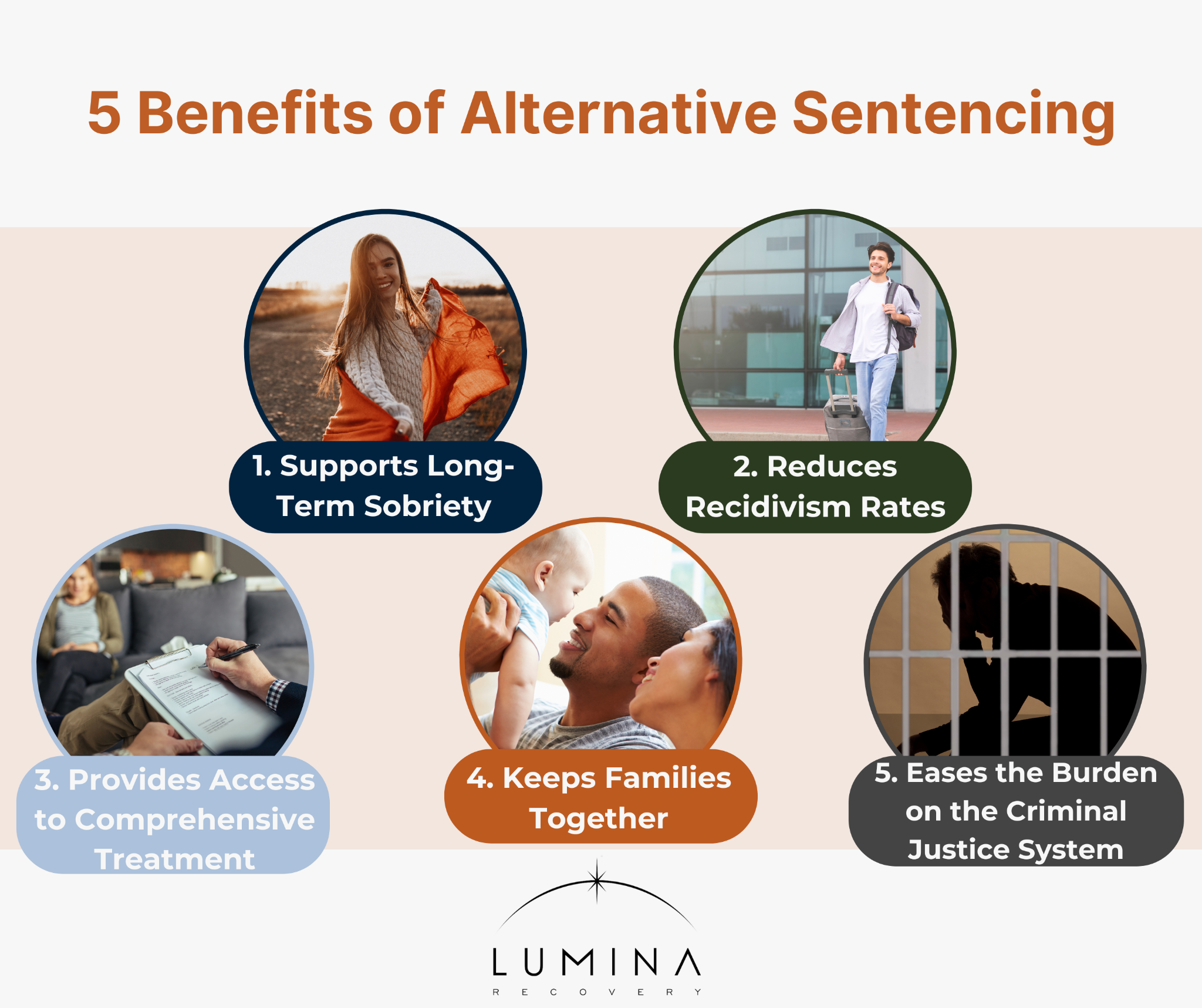An alternative sentencing program is a judicial approach that provides offenders with rehabilitation-focused options instead of incarceration. These programs aim to address the root causes of criminal behavior, such as substance use disorders and mental health challenges, while reducing recidivism and easing the burden on the criminal justice system.
For those struggling with addiction, or their loved ones seeking guidance, understanding how alternative sentencing works can provide hope and direction.
What Is Alternative Sentencing?
Alternative sentencing programs are structured interventions designed to divert individuals found guilty of non-violent crimes from traditional incarceration into supervised treatment, rehabilitation, or community-based programs.
For those with drug-related offenses, these programs aim to address the underlying causes of addiction, reduce repeat offenses, and support long-term recovery. Rather than punishment, they emphasize rehabilitation, equipping individuals with tools for a healthier future.
These initiatives hold individuals accountable while providing them with opportunities for personal growth, ultimately reducing their likelihood of reoffending.
4 Types of Alternative Sentencing Programs
Alternative sentencing programs offer various pathways for individuals with substance use disorders or co-occurring mental health conditions. Some of the programs available for those with drug-related offenses include:
1. Drug Courts
Drug courts are specialized judicial programs that offer individuals struggling with substance use disorders a structured recovery path. Instead of serving jail time, offenders undergo supervised treatment, counseling, and frequent drug testing.
2. Veterans Courts
Veterans courts cater specifically to military veterans who have committed offenses, often as a result of post-traumatic stress disorder (PTSD), substance abuse, or other service-related challenges. These programs connect veterans with counseling, treatment services, and peer support networks.
3. Co-Occurring Disorders Courts
For individuals with both addiction and mental health disorders, co-occurring disorders courts focus on treatment by ensuring appropriate psychiatric care, counseling, and medication management. These courts work to address the underlying mental health issues contributing to criminal behavior, thereby reducing future offenses.
4. Second Chance Women’s Re-Entry Courts
These programs are designed specifically for women who have been involved in the criminal justice system due to neglectful parenting, criminal behavior, and drug abuse. They provide trauma-informed care, substance abuse and mental health treatment, job training, education programs, and parenting and life skills development.
Eligibility Criteria for Alternative Sentencing
Eligibility for an alternative to incarceration programs varies by state and depends on several factors, including:
- Nature of the offense such as possession, DUI, or minor drug-related crimes
- First-time or low-level repeat offenders
- Willingness to participate in rehabilitation programs
- Diagnosis of substance use disorder or dual diagnosis
Process of Alternative Sentencing
The alternative sentencing process involves several key steps to ensure that eligible offenders receive appropriate rehabilitation and supervision while fulfilling their legal obligations.
- Assessment: Before being placed in an alternative sentencing program, an offender undergoes an assessment to determine their eligibility. This may involve reviewing criminal history, conducting psychological evaluations, and assessing substance use disorders.
- Program Assignment: Based on assessment results, the offender is assigned to a suitable program, such as a drug court, veterans court, or community service.
- Monitoring and Compliance: Participants are required to comply with strict guidelines, including court appearances, counseling sessions, random drug tests, or community service requirements. Non-compliance may result in harsher penalties or a return to traditional sentencing.
- Completion and Outcomes: Successful completion of the program can result in benefits such as reduced charges, expunged records, or the opportunity to reintegrate into society with improved personal stability and job prospects.
5 Benefits of Alternative Sentencing
The benefits of sentencing alternative programs extend beyond the individual offender, positively impacting the criminal justice system and society as a whole.
1. Supports Long-Term Sobriety
These programs address the root causes of addiction rather than merely punishing the behavior, helping individuals develop coping skills for long-term recovery.
2. Reduces Recidivism Rates
Individuals who complete drug court and similar programs are less likely to reoffend compared to those who serve traditional sentences.
According to a report from the Countywide Criminal Justice Coordination Committee (CCJCC), more than 70% of individuals who successfully completed a drug court program remained conviction-free for at least five years after graduation.1
3. Provides Access to Comprehensive Treatment
Alternative sentencing often includes individual therapy and mental health services, ensuring holistic care for addiction and co-occurring disorders.
4. Keeps Families Together
Avoiding incarceration allows individuals to stay connected with their families, maintain employment, and contribute positively to their communities.
5. Eases the Burden on the Criminal Justice System
By diverting non-violent drug offenders from prisons into treatment, these programs help reduce overcrowding and save taxpayer money.
FAQs
What is alternative sentencing?
Alternative sentencing refers to judicial programs that provide rehabilitation-focused sentencing alternatives rather than traditional incarceration. These programs address the root causes of criminal behavior, particularly addiction and mental health disorders.
What crimes qualify for alternative sentencing?
Typically, non-violent offenses, including drug-related crimes, minor theft, and certain DUIs, may qualify. Eligibility is determined on a case-by-case basis.
How do drug courts help offenders with addiction?
Drug courts provide structured recovery programs, including treatment, therapy, and strict accountability measures, to support sobriety and prevent future offenses.
Can alternative sentencing lead to a criminal record being expunged?
In some cases, successful completion of an alternative sentencing program may result in reduced charges or expungement, depending on state laws.
What happens if someone violates the terms of an alternative sentencing program?
Non-compliance may lead to harsher penalties or a return to traditional sentencing.
Start Rehabilitation Today With Lumina Recovery
Alternative sentencing programs offer individuals struggling with addiction a chance to receive necessary treatment while avoiding incarceration. By focusing on rehabilitation, these programs support long-term recovery and a better future.
Lumina Recovery’s dual diagnosis programs provide integrated care for substance use and mental health disorders, ensuring a well-rounded recovery approach. We also offer outpatient treatment for individuals involved in alternative sentencing, providing therapy, counseling, and relapse prevention support.
If you or a loved one is facing legal challenges due to addiction, contact Lumina Recovery today to explore treatment options and take the first step toward healing.
Source:
- Los Angeles County District Attorney’s Office. Alternative Sentencing Courts.




